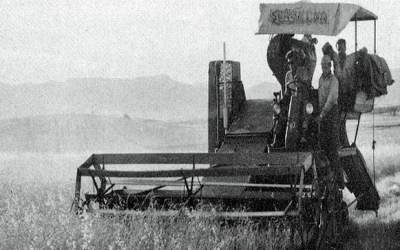
Our Philosophy
UNITED WE STAND. This is the association’s basic concept. What cannot be done by someone alone, can be done by two people. What cannot be done by two people, can be done by three...Association means joining forces, it is the common effort to achieve common goals. The Union of Agrinio is the result of this effort...

The whole philosophy of the Union of Agrinio is included in the above logo.
Having faith in the principles of the cooperative movement, the Union of Agrinio is not limited to organizational issues nor to the labyrinth-like bureaucratic processes. Through substantive interventions, the Union is an actor in shaping agricultural policy, always within the scope of defending the interests of the farmers. It is, therefore, a key driver of rural economy growth in Aetoloakarnania.
Our philosophy is clearly described in the trademark of the Cooperative: Two people joining hands, uniting their forces, in a coalition that will undoubtedly benefit them both. They are surrounded and protected by the cycle of the Union, represented by the two reverse "E" (“Enossi” is “Union” in Greek), a cycle that is crowned by a plant that grows and gives fruit, symbolizing the production. The colours are green, as the colour that the farmers are content to see in their crops, and brown, as this is the one of the fruitful land.
The Union’s trademark is our guide: We join our forces, we work and we produce. We strengthen the cooperative because it is the one that strengthens our every step. The relationship is bidirectional. We're all you...
Here are the cooperative principles, namely the guidelines by which cooperatives implement their values:
1st Principle: Voluntary and open membership
Cooperatives are voluntary organizations, open to all persons able to use their services and willing to accept the responsibilities of membership, without discrimination regarding gender, social status, race, political affiliation or religion.
2nd Principle: Democratic management by the members
Cooperatives are democratic organizations managed by their members, who actively participate in the decision-making and the formulation of Cooperatives’ policy. The women and men who offer their services as elected representatives are accountable to the members. At the first degree cooperatives the members have equal voting rights (each member one vote) and at the second-degree cooperatives the relevant procedure is democratically organized as well.
3rd Principle: Financial participation of the members
Members participate equally and manage democratically the cooperative’s capital. At least part of the afore-mentioned capital constitutes the cooperative’s common property. The members usually enjoy limited or no compensation for the capital they have deposited to become members.
The members allocate surpluses for all or some of the following purposes:
- Cooperative’s development, possibly by setting up reserves part of which shall be undistributed,
- Reimbursement to the members in proportion to their transactions with the cooperative, and
- Other activities’ financial support, approved by the members.
4th Principle: Autonomy and Independence
Cooperatives are autonomous self-help organizations, managed by their members. They are free to enter into agreements with other organizations, including governments, or raise capital from other sources, provided that they follow the rules ensuring the democratic administration of the members and maintain their cooperative autonomy.
5th Principle: Education, on-the-job training and information
Cooperatives provide education and on-the-job training to their members, to the elected members of the managing board, to the managers and the employees, so as they can effectively contribute to the cooperative’s development. Cooperatives provide information to the public – particularly to young people and to opinion leaders - on the nature and benefits of cooperation.
6th Principle: Cooperation among cooperatives
Cooperatives serve their members as efficiently as possible and actually enhance the cooperatives’ existence when they are working together within local, national, regional and/or international organizations.
7th Principle: Interested for the community
Cooperatives work for the sustainable development of their communities through policies approved by their members.




